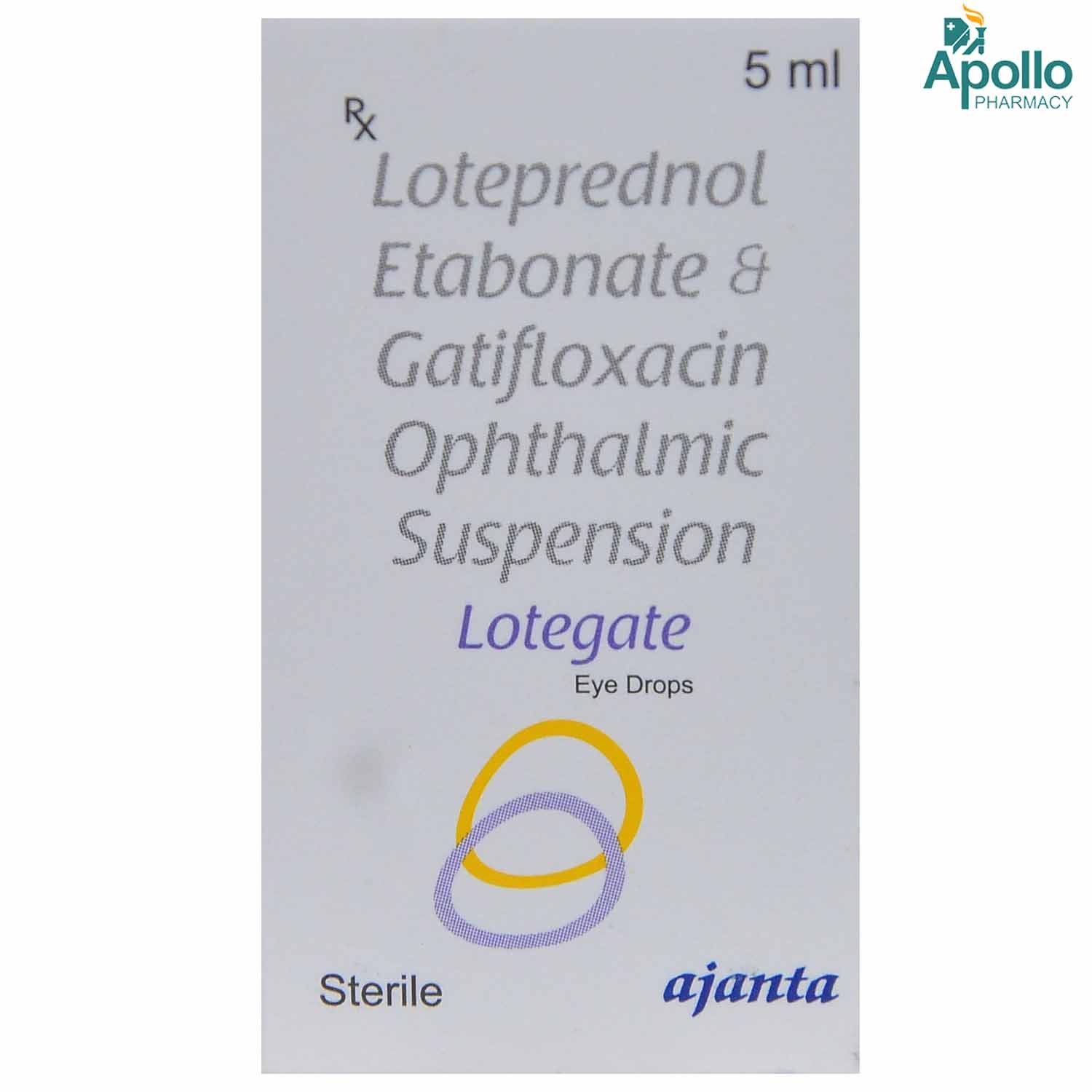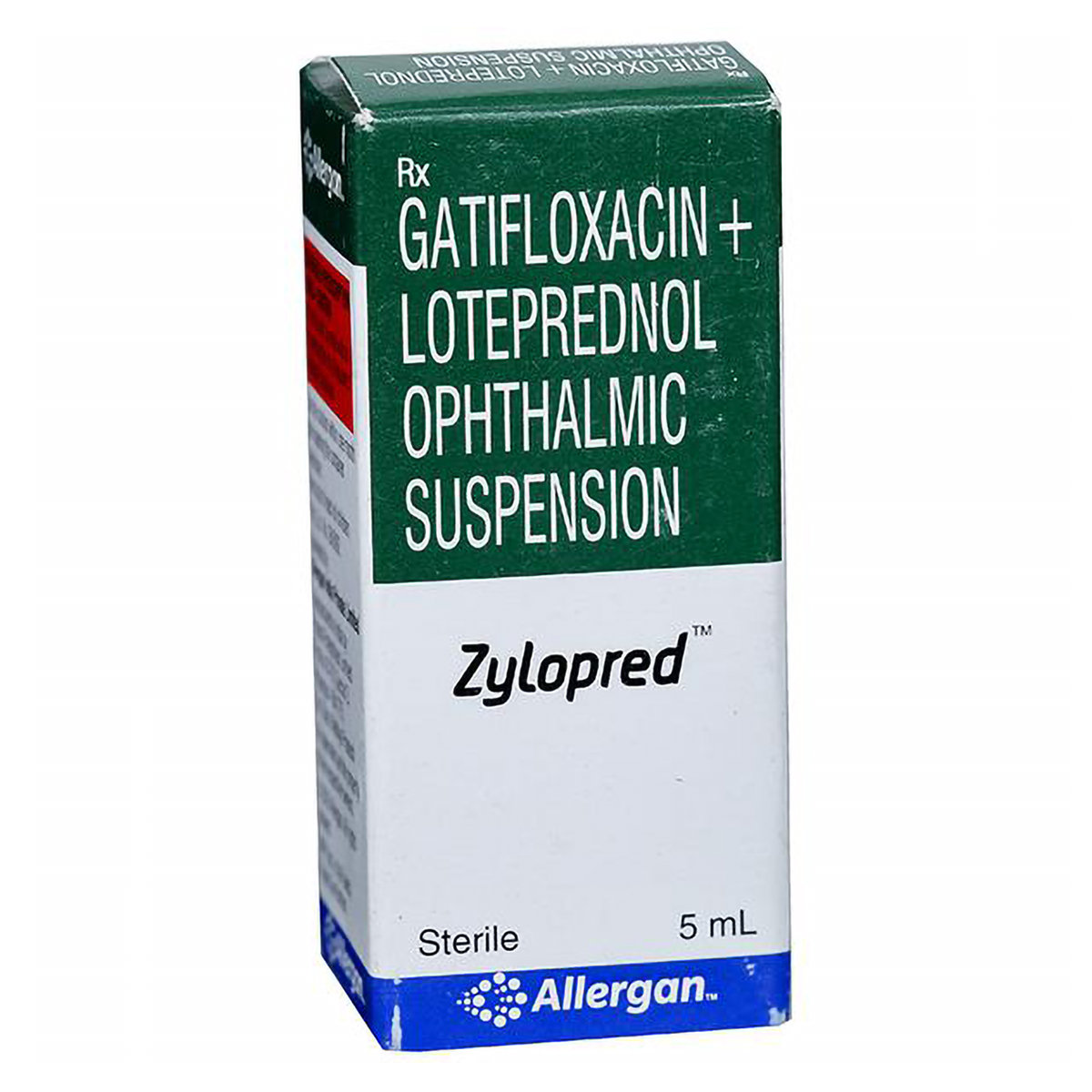Gatifloxacin+loteprednol
About Gatifloxacin+loteprednol
Gatifloxacin+loteprednol consists of a combination of an eye medication containing antibiotic and corticosteroid, primarily used to treat bacterial infections, including conjunctivitis/pink eye. It also decreases the risk of eye infections such as conjunctivitis (inflammation of the conjunctiva) and other eye inflammatory conditions (cornea, iris, and connective tissue) in postoperative patients. A bacterial eye infection occurs when bacteria invade any part of the eyeball or its surrounding tissues, including the cornea (clear front surface of the eye) and the conjunctiva (thin membrane lining the outer eye and inner eyelids). A bacterial eye infection symptoms include red eyes, pain, swelling of eyes, watery eyes, itching, and blurry vision.
Gatifloxacin+loteprednol contains Gatifloxacin (antibiotic) and Loteprednol (corticosteroid). Gatifloxacin is an antibiotic that helps treat and prevent a wide range of bacterial infections. It kills bacteria (bactericidal action) by preventing the synthesis of enzymes, namely DNA gyrase and Topoisomerase IV, which is essential for the growth and survival of the bacterial cell. Loteprednol is a corticosteroid with anti-inflammatory properties and acts by inhibiting the chemicals such as prostaglandins production (chemical messengers) that make the eye red, swollen, and itchy. It reduces symptoms associated with infection, such as redness and irritation of the eye, and decreases the risk of infections.
Gatifloxacin+loteprednol is for external use only. Use Gatifloxacin+loteprednol as prescribed by your doctor. Gatifloxacin+loteprednol is only for use in the eyes. Do not swallow or inject Gatifloxacin+loteprednol. You are advised to use Gatifloxacin+loteprednol for as long as your doctor has prescribed it based on your medical condition. If you wear contact lenses or are wearing them, remove them before using Gatifloxacin+loteprednol, and you can put them back 15 minutes after using Gatifloxacin+loteprednol. You may experience watery eyes, irritation in the eyes, and eye itching, in some cases. Most of these side effects of Gatifloxacin+loteprednol are temporary, do not require medical attention, and gradually resolve over time. However, if the side effects are persistent, reach out to your doctor.
Do not take Gatifloxacin+loteprednol if you are allergic to antibiotics, corticosteroids or any ingredient of Gatifloxacin+loteprednol. Put Gatifloxacin+loteprednol only if the doctor prescribes you. It would help if you did not stop taking Gatifloxacin+loteprednol abruptly, as it may worsen your symptoms. Also, do not put more than the prescribed dose of Gatifloxacin+loteprednol, as it may cause glaucoma or optic nerve damage. Do not take any other eye medication with Gatifloxacin+loteprednol without consulting your doctor. The use of loteprednol in Gatifloxacin+loteprednol after cataract surgery is known to slow the surgery's healing process, so it is given in a very minimum dose. If you have or ever had glaucoma (increased eye pressure), herpes simplex infection, or any other eye problem, are pregnant or breastfeeding, do not take Gatifloxacin+loteprednol until prescribed by your doctor.
Uses of Gatifloxacin+loteprednol
Medicinal Benefits
Gatifloxacin+loteprednol is a combination of two drugs: Gatifloxacin (antibiotic) and Loteprednol (corticosteroid). Gatifloxacin belongs to the group of medicines called fluoroquinolone antibiotics used to treat bacterial infections, including conjunctivitis (pinkeye). It kills bacteria (bactericidal action) by preventing the synthesis of enzymes, namely DNA gyrase and Topoisomerase IV, which is essential for the growth and survival of the bacterial cell. Gatifloxacin+loteprednol has a broad spectrum of antibacterial activity against aerobic gram-positive and aerobic gram-negative bacteria (that live in oxygen). Loteprednol is a corticosteroid that works by blocking prostaglandins (a chemical messenger) in the brain, making the eye red, swollen and itchy. As a result, it reduces symptoms associated with infection, such as redness and irritation of the eye, and decreases the risk of infections. Gatifloxacin+loteprednol is used to prevent or treat only bacterial eye infections.
Directions for Use
Storage
Side Effects of Gatifloxacin+loteprednol
- Eye irritation
- Eye redness
- Pain on the administration of medicine
- Blurred vision
- Decreases in taste sensitivity (dysgeusia)
- Anterior chamber inflammation
Drug Warnings
Do not take Gatifloxacin+loteprednol if you are allergic or have had a severe reaction to the quinolone or fluoroquinolone antibiotics and corticosteroids or any of the ingredients of Gatifloxacin+loteprednol. Please inform your doctor if you are pregnant or breastfeeding before starting Gatifloxacin+loteprednol. Gatifloxacin+loteprednol is not recommended for children below one year of age as safety and effectiveness have not been established. Do not stop taking Gatifloxacin+loteprednol even if you feel better without asking your doctor, as your symptoms may come back and may even worsen your condition. Please do not take more than the prescribed dose of Gatifloxacin+loteprednol as it may cause glaucoma, increase the risk of cataracts (clouding of the eye), and secondary infection. To avoid any contamination, avoid touching the tip of the dropper. Do not put to eye medication simultaneously; wait for at least 10 minutes before putting in the second medication. If you have or have ever had glaucoma (increased eye pressure), herpes simplex infection, or any other eye problem, do not take Gatifloxacin+loteprednol until prescribed by your doctor. Prolonged use of corticosteroids may result in glaucoma with damage to the optic nerve and defects in visual acuity and fields of vision. If this product is used for ten days or longer, intraocular pressure (IOP) should be monitored.
Drug Interactions
Drug-drug interactions: Gatifloxacin+loteprednol may interact with other ophthalmic medications (bromfenac, diclofenac, flurbiprofen, ketorolac, nepafenac, suprofen, bimatoprost, latanoprost, tafluprost), HIV medicines (ritonavir, cobicistat, darunavir, nelfinavir), antibiotic medication (clarithromycin), and vaccine (smallpox vaccine).
Drug-Food Interactions: No interaction found.
Drug-Disease Interactions: Gatifloxacin+loteprednol should not be used in patients with fungal infections, viral infections such as herpes simplex or varicella, or parasitic infections such as amoebiasis, tuberculosis, damaged cornea, ulceration, and glaucoma (increased pressure inside the eye).
Drug-Drug Interactions Checker List:
Safety Advice

Alcohol
cautionIt is best to avoid alcohol while taking medication. Gatifloxacin+loteprednol makes you dehydrated and affects eye pressure and the ability to fight infections.

Pregnancy
cautionPlease consult the doctor. There are no adequate and well-controlled studies on pregnant women. Your doctor will prescribe only if the benefits outweigh the risks.

Breast Feeding
cautionLet your doctor know if you are a nursing mother before taking Gatifloxacin+loteprednol; your doctor will decide whether Gatifloxacin+loteprednol can be taken by breastfeeding mothers or not.

Driving
cautionGatifloxacin+loteprednol may cause side effects like blurry vision, which could affect your ability to drive. Do not drive or operate machinery in such cases. Drive only when you are alert and have a clear vision.

Liver
safe if prescribedLet your doctor know before receiving Gatifloxacin+loteprednol if you have had a history of liver impairment/disorder. Your doctor will prescribe only if the benefits outweigh the risks.

Kidney
safe if prescribedLet your doctor know before receiving Gatifloxacin+loteprednol if you have had a history of kidney impairment/disorder. Your doctor will prescribe only if the benefits outweigh the risks.

Children
cautionPlease consult your doctor if the Gatifloxacin+loteprednol is to be used in children. Safety and effectiveness in pediatric patients have not been established.
Habit Forming
Diet & Lifestyle Advise
- Try to maintain good hygiene to keep your eyes clean and irritant-free.
- Do not rub your eyes even though some ophthalmic drugs make your eye itchy.
- Know your allergy triggers, such as pollen, dust, and other factors.
- Sleep for at least six to eight hours to rejuvenate your eyes naturally.
- Wash your eyes with clean water at least two to three times a day
- Manage stress, eat healthily, drink plenty of water, exercise regularly, and get plenty of sleep.
- Wash your hands thoroughly and do not touch the dropper before using drops to avoid contamination.
- Reduce screen time (by avoiding watching tv, or phone) and use sunglasses while going out into the sunlight.
- Avoid alcoholic beverages as it can make you dehydrated and affect the eye's pressure. This effect can also affect your body’s ability in fighting off infections.
Special Advise
- Do not take Gatifloxacin+loteprednol on your own, as self-medication may lead to antibiotic resistance in which antibiotics fail to act against specific bacterial infections.
- Using Gatifloxacin+loteprednol for prolonged may result in a new fungal eye infection (secondary infection). Do not use Gatifloxacin+loteprednol for longer than prescribed.
- Gatifloxacin+loteprednol should not be administered directly into the eye's anterior chamber.
- Please consult an eye specialist if your eye infection persists or worsens after using Gatifloxacin+loteprednol for a week.
- Have frequent follow-up check-ups with your doctor to check for any problems such as cataracts, an increase in pressure, or infections if you are using it is prescribed for long-term use.
Patients Concern
Disease/Condition Glossary
Bacterial eye infection: A bacterial eye infection occurs when bacteria invade any part of the eyeball or surrounding tissues, including the cornea (clear front surface of the eye) and the conjunctiva (thin membrane lining the outer eye inner eyelids). A bacterial eye infection symptoms include red eyes, pain, swelling of eyes, watery eyes, itching, and blurry vision. Some prevalent/very common eye infections are Conjunctivitis (pink eye) and Stye.
Conjunctivitis: A condition caused by the inflammation and irritation of the eye's mucous membrane (conjunctiva).
Stye: Formation of a bump on the eyelid that happens when bacteria from the skin get into an eyelash's hair follicle.
FAQs
Gatifloxacin+loteprednol is a combination of drugs: Gatifloxacin and Loteprednol. Gatifloxacin is an antibiotic that stops the growth of bacteria that is causing the infection. Loteprednol is a corticosteroid with an anti-inflammatory activity that reduces eye discomfort and the risk of eye infections.
You should avoid contaminating the applicator tip of Gatifloxacin+loteprednol with material from the eye, fingers, or other sources. Try not to share personal cloth or stuff till your eye infections persist. Besides this, do not wear contact lenses, as it can cause your eye condition to get worse.
Gatifloxacin+loteprednol is recommended for use in the eye only. It is not recommended for treating ear problems.
Avoid prolonged use, as it may cause cataracts (clouding of the eye) and increase the risk of a second infection. Also, do not wear contact lenses while using Gatifloxacin+loteprednol.
Do not take Gatifloxacin+loteprednol on your own as self-medication may lead to antibiotic-resistance in which antibiotics fail to act against specific bacterial infections.
Yes, the Gatifloxacin+loteprednol is known to cause eye irritation. Gatifloxacin+loteprednol contains a preservative, Benzalkonium chloride, which is known to cause eye irritation. If it becomes severe, please visit your doctor immediately.




